英语日常交流的常见问句
- 格式:doc
- 大小:99.50 KB
- 文档页数:12
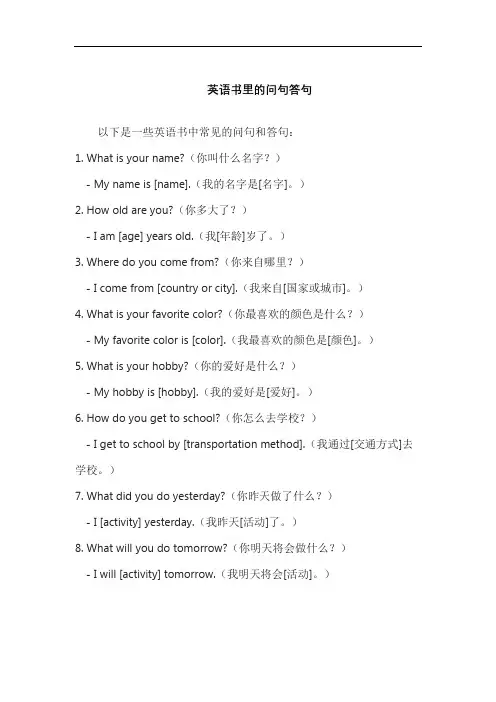
英语书里的问句答句
以下是一些英语书中常见的问句和答句:
1. What is your name?(你叫什么名字?)
- My name is [name].(我的名字是[名字]。
)
2. How old are you?(你多大了?)
- I am [age] years old.(我[年龄]岁了。
)
3. Where do you come from?(你来自哪里?)
- I come from [country or city].(我来自[国家或城市]。
)
4. What is your favorite color?(你最喜欢的颜色是什么?)
- My favorite color is [color].(我最喜欢的颜色是[颜色]。
)
5. What is your hobby?(你的爱好是什么?)
- My hobby is [hobby].(我的爱好是[爱好]。
)
6. How do you get to school?(你怎么去学校?)
- I get to school by [transportation method].(我通过[交通方式]去学校。
)
7. What did you do yesterday?(你昨天做了什么?)
- I [activity] yesterday.(我昨天[活动]了。
)
8. What will you do tomorrow?(你明天将会做什么?)
- I will [activity] tomorrow.(我明天将会[活动]。
)。
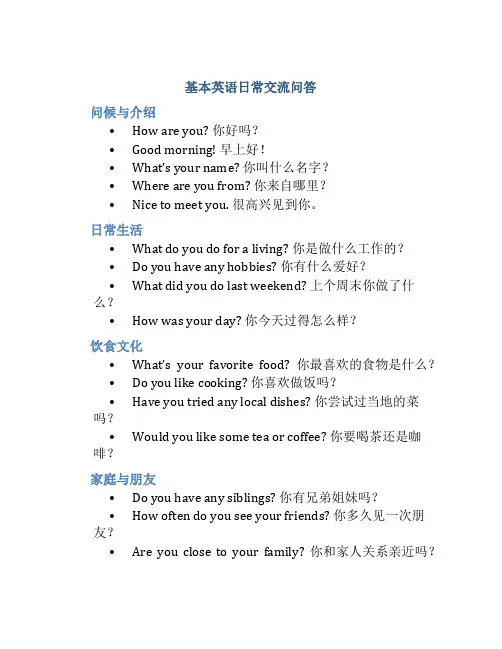
基本英语日常交流问答问候与介绍•How are you? 你好吗?•Good morning! 早上好!•What’s your name? 你叫什么名字?•Where are you from? 你来自哪里?•Nice to meet you. 很高兴见到你。
日常生活•What do you do for a living? 你是做什么工作的?•Do you have any hobbies? 你有什么爱好?•What did you do last weekend? 上个周末你做了什么?•How was your day? 你今天过得怎么样?饮食文化•What’s your favorite food? 你最喜欢的食物是什么?•Do you like cooking? 你喜欢做饭吗?•Have you tried any local dishes? 你尝试过当地的菜吗?•Would you like some tea or coffee? 你要喝茶还是咖啡?家庭与朋友•Do you have any siblings? 你有兄弟姐妹吗?•How often do you see your friends? 你多久见一次朋友?•Are you close to your family? 你和家人关系亲近吗?•Have you ever been to a family reunion? 你有参加过家庭聚会吗?旅行与假期•Where is your favorite place to travel? 你最喜欢去哪里旅行?•Have you ever been on a road trip? 你有进行过公路旅行吗?•How do you usually spend your holidays? 你通常怎么度过假期?•What’s the most memorable trip you’ve taken? 你印象最深刻的旅行是什么?教育与工作•What do you study or work on? 你学习或工作的内容是什么?•How do you like your job or major? 你对工作或专业满意吗?•Are you planning to further your education? 你有继续深造的计划吗?•What skills do you think are important for your future career? 你认为对未来职业发展重要的技能是什么?以上是一些基本的日常交流问答,希望对你有所帮助。
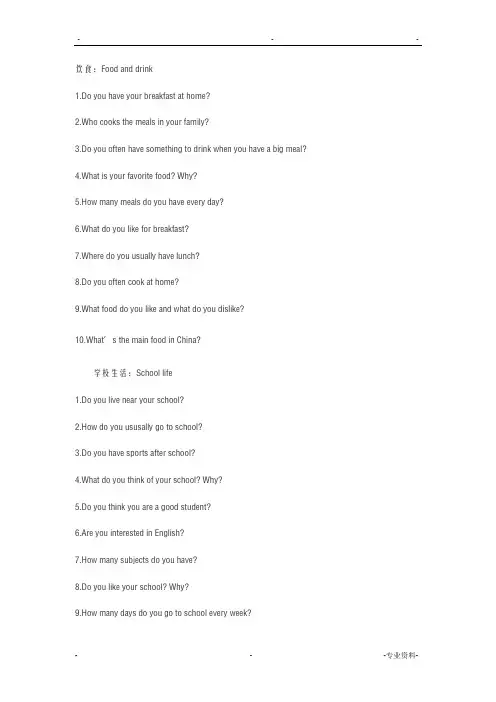
饮食:Food and drink1.Do you have your breakfast at home?2.Who cooks the meals in your family?3.Do you often have something to drink when you have a big meal?4.What is your favorite food? Why?5.How many meals do you have every day?6.What do you like for breakfast?7.Where do you usually have lunch?8.Do you often cook at home?9.What food do you like and what do you dislike?10.What’s the main food in China?学校生活:School life1.Do you live near your school?2.How do you ususally go to school?3.Do you have sports after school?4.What do you think of your school? Why?5.Do you think you are a good student?6.Are you interested in English?7.How many subjects do you have?8.Do you like your school? Why?9.How many days do you go to school every week?10.Can you tell me five subjects you study at school?11.Which is more popular in your school, football or basketball?12.Do you have a lot of homework to do every day?13.Can you say something about your class?天气Weather:1.Is it raining now?2.Do you like rainy days?3.How many seasons are there in a year?4.What’s your favorite season?Why?5.Is it a fine day?6.What’s the weather like here in spring?7.What sports do you usually do in summer?8.Does it often snow here in winter?9.How can you know the weather?10.What’s the weather like here in winter?11.Do you like spring?Why?周围的环境environments around:1.Is there a park near your home?2.How often do you go to the park?3.Do you think your hometown is beautiful?4.Who cleans your classroom every day?5.How do you keep our environments clean?6.Is there a supermarket near here?7.Where did you buy your schoolbag?8.How much is your bag?9.Do you like the bag? Why?10.Where is your hometown?11.Is there any river near your home?12.Do you live in the city or in the country?13.Which do you prefer, living in the city or living in the country? Why?个人情感Emotions:1.Are you happy today?2.Do you like pop music?3.Who is the most popular teacher in your school?4.Will you get angry if your friend hit you? Why?5.Do you love your teacher?6.How are you getting on with your classmates?7.What do you think of your school life?8.Do you think you are a happy boy/girl? Why?家庭、朋友与周围的人:Family, friends and people around1.Are you the only child in your family?2.Do you have any friends?3.What do you usually do when you stay with your friends?4.Are you happy when you stay with your family members?Why?5.Do you love your family?6.How many people are there in your family?7.Do you have many friends?8.Who is your best friend? What do you often do when you get together?9.Are you happy at home? Why?10.Do you prefer big families or small families?11.Could you tell me something about your family?人际关系:Interpersonal relationships:1.Do you have any brothers /sisters?2.What do you think of your parents?3.Who is your best friend?4.Are you happy at school? Why?节假日活动:Festivals and holidays1.Do you like May Day?2.What are you going to do on May Day?3.Do you go to school on Saturday?4.What do you often do on Sundays?5.When is Children’s Day?6.Can you tell me three traditional festivals in China?7.What’s your favorite English festival?8.What food do Chinese people often have in Spring Festival?9.Do you like Mid-autumn Day? Why?10.When is National Day?11.Do you like going out when you are free?12.What do you often do on New Year’s Day?13.Do you like Spring Festival? Why?14.Which is more popular in China, Christmas Day or Spring Festival?日常生活:Daily routines:1.Do you watch TV every day?2.What time do you usually go to school?3.What do you usually do on weekend?4.Do you like go shopping? Why?5.Are you busy these days?6.Do you have classes from Monday to Friday?7.How do you usually go to school?8.How do you spend your free time?9.Is your school far from your home?10.What do you usually do on Sundays?兴趣与爱好:Interests and hobbies1.Do you like playing football?2.Are you interested in watching TV?3.What is your favorite color?4.Which subject do you like best?5.What do you usually do in your free time?6.Do you like sports?7.Do you have much time on sports?8.What is the most popular sport in China?9.How do you spend your free time?10.Do you like singing?11.Who is your favorite singer?12.Are you interested in playing computer games?13.What do you usually do when you are free?14.What’s your hobby?健康:Health1.Do you have breakfast every day?2.Is smoking good or bad for your health?3.What is your favorite food?4.Do you have fruit every day?Why?5.Do you do morning exercise every day?6.Can you tell me three healthy food?7.Which is more important, money or health?8.Do you like fast food? Why?9.What time do you usually have sports?10.Is watching TV too much good or bad for your health?11.How to keep healthy?娱乐和运动:Entertainment and sports1.What do you think of music?2.What is your favorite sport?3.Can you sing an English song?计划与愿望:Plans and intentions1.Are you going to watch TV tonight?2.What are you going to do this weekend?3.Do you make a plan when new school year begins?4.What do you want to be when you grow up?5.How to make your dream come true?购物:Shopping1.Is there a supermarket near your home?2.Where did you buy your pen?3.How much is your jacket/shirt/skirt?4.Do you like going shopping? Why?旅游和交通:Travel and transport1.Do you want to buy a car?2.Have you ever been to Hainan?3.How do you like Changsha? Why?4.Do you enjoy travelling?5.What should you prepare before travelling?6.Where have you travelled?7.What’s your favorite way of travelling?8.What do you usually do on your holidays?9.How did you get to school today?语言学习:language learning1.Are you good at English?2.Who is your English teacher?3.Do you think English is interesting?4.What other languages do you want to learn? Why?5.How long have you been studying English?6.Do you like studying English?7.What other language do you know? /like?8.How do you learn foreign language?自然:Nature1.Do you like mountains?2.Have you ever been to any place of interest in our country?3.Do you often go to the zoo?4.What animals do you like best?世界与环境:The world and environment1.Is the world becoming warmer and warmer now?2.Are there any trees near your house?3.What can we do to make our city nice and clean?4.What do you think of our environment, is it good or not good? Why?。
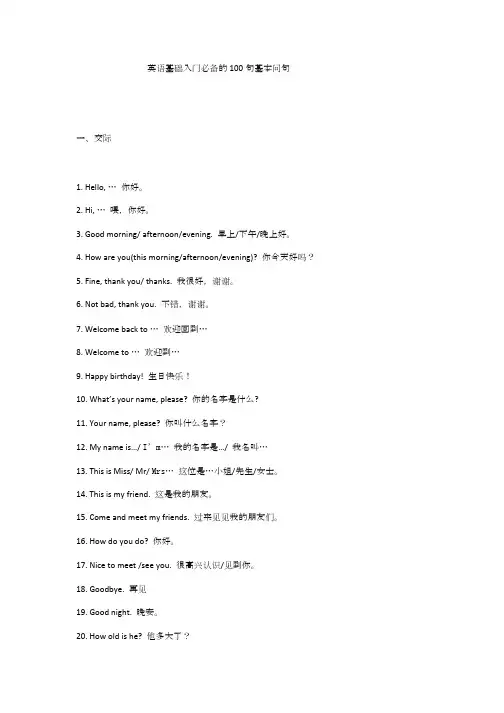
英语基础入门必备的100 句基本问句一、交际1. Hello, …你好。
2. Hi, …喂,你好。
3. Good morning/ afternoon/evening. 早上/下午/晚上好。
4. How are you(this morning/afternoon/evening)? 你今天好吗?5. Fine, thank you/ thanks. 我很好,谢谢。
6. Not bad, thank you. 不错,谢谢。
7. Welcome back to …欢迎回到…8. Welcome to …欢迎到…9. Happy birthday! 生日快乐!10. What’s your name, please? 你的名字是什么?11. Your name, please? 你叫什么名字?12. My name is…/ I’m…我的名字是…/ 我名叫…13. This is Miss/ Mr/ Mrs…这位是…小姐/先生/女士。
14. This is my friend. 这是我的朋友。
15. Come and meet my friends. 过来见见我的朋友们。
16. How do you do? 你好。
17. Nice to meet /see you. 很高兴认识/见到你。
18. Goodbye. 再见19. Good night. 晚安。
20. How old is he? 他多大了?21. Thank you./ Thanks. 谢谢。
22. You’re welcome. 不用谢。
23. That’s all right. 没关系。
24. I’m sorry. 对不起。
25. Sorry, I don’t know. 对不起,我不知道。
26. Excuse me. 对不起,打扰一下。
27. Come in, please. 请进。
28. Have some bananas, please. 请吃些香蕉。
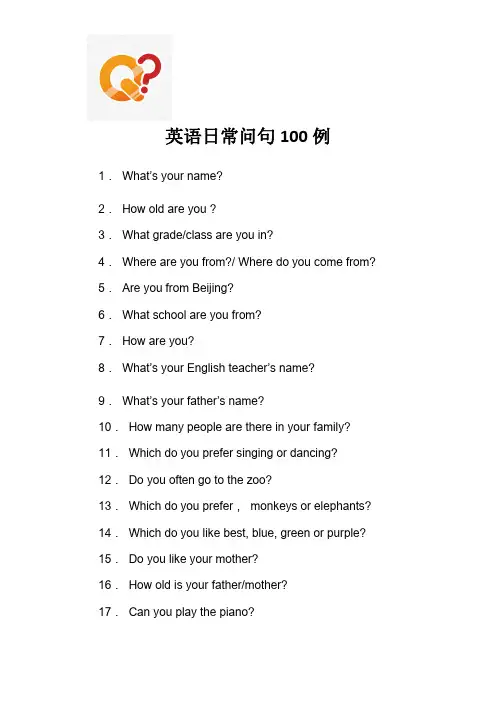
英语日常问句100例1.What’s your name?2.How old are you?3.What grade/class are you in?4.Where are you from?/Where do you come from? 5.Are you from Beijing?6.What school are you from?7.How are you?8.What’s your English teacher’s name? 9.What’s your father’s name?10.How many people are there in your family? 11.Which do you prefer singing or dancing? 12.Do you often go to the zoo?13.Which do you prefer,monkeys or elephants? 14.Which do you like best,blue,green or purple? 15.Do you like your mother?16.How old is your father/mother?17.Can you play the piano?19.What’s your favorite color?20.Can you play the violin?21.Which do you prefer,your English teacher or Chinese teacher?22.Can you play football?23.Which do you prefer,rice or noodles?24.Do you like your school?Why?25.Which do you prefer,cartoons or news?26.How many bananas are there in the picture? 27.What color are they?28.What day is today?29.What’s the weather today?30.What time do you often get up?31.What time do you have breakfast/lunch?32.What’s your favorite animal/color/food?33.What animal don’t you like?3.4What food don’t you like?35.Do you like playing football?36.Do you like Yao Ming?Why?37.Do you like other sports?39.Do you like basketball?40.What color is your shirt?41.What do you like to eat?42.Do you like English book?43.If you don’t like reading,what do you like?44.Do you have a pet?45.Do you have a cat or a dog?46.Do you like sports?47.What do you like doing in your free time?48.What do you hope for?49.In the future,what job do you want?50.If you want to be a millionaire,what would you buy?51.Do you like cars?What color cars?52.Do you like bananas?Do you eat bananas every day?53.What’s your mother’s job?54.Do you like a sunny day or a rainy day?Why?55.Do you like summer or winter?15.Do you like watching TV?56.What’s your favorite season,spring,summer,fall or winter?57.How long have you learned English?58.What’s your English/Chinese name?59.How do you come to school?60.Where do they usually have lunch?61.What do they do in their free time?62.How often do you come to the library?63.How long can I keep them?64.What do you think of it?65.How do you like it?66.Which subject do you like best?67.Why do you like it?68.Where is your bedroom?69.What kind of home do you live in?70.Which floor do you live on?71.How can I get to the library?72.Excuse me,where is the hospital?73.Excuse me,is there a post office near here?74.Excuse me,which is the way to the park?75.Excuse me,could you tell me the way to the zoo?76.How far is it from here?77.Which bus should/can I take?78.Where is the bus stop?79.Is it far from here?80.When was she born,do you know?81.Where was she born?82.When is your birthday?83.How do you plan to celebrate it?85.What present do you want to buy for her?86.What's the date today?87.What's the shape of your present?88.What can you do at the party?89.What else can you do?90.How was Kangkang's birthday party?91.What time did you go home last night?92.What's the matter?93.What's the weather like in spring?94.How is the weather in fall?95.Which season do you like best,spring,summer,fall or winter?96.What is the weather like in Beijing?97.What's the temperature,do you know?98.What places should I visit in Yunnan?99.How are things going?100.When is the Spring Festival?。
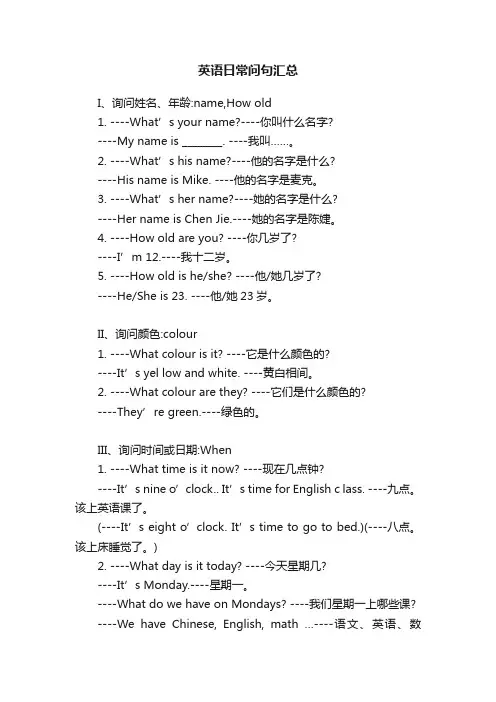
英语日常问句汇总I、询问姓名、年龄:name,How old1. ----What’s your name?----你叫什么名字?----My name is ________. ----我叫……。
2. ----What’s his name?----他的名字是什么?----His name is Mike. ----他的名字是麦克。
3. ----What’s her name?----她的名字是什么?----Her name is Chen Jie.----她的名字是陈婕。
4. ----How old are you? ----你几岁了?----I’m 12.----我十二岁。
5. ----How old is he/she? ----他/她几岁了?----He/She is 23. ----他/她23岁。
II、询问颜色:colour1. ----What colour is it? ----它是什么颜色的?----It’s yel low and white. ----黄白相间。
2. ----What colour are they? ----它们是什么颜色的?----They’re green.----绿色的。
III、询问时间或日期:When1. ----What time is it now? ----现在几点钟?----It’s nine o’clock.. It’s time for English c lass. ----九点。
该上英语课了。
(----It’s eight o’clock. It’s time to go to bed.)(----八点。
该上床睡觉了。
)2. ----What day is it today? ----今天星期几?----It’s Monday.----星期一。
----What do we have on Mondays? ----我们星期一上哪些课?----We have Chinese, English, math …----语文、英语、数学……3. ----When is your birthday? ----你的生日是什么时候?----It’s October 1st, our National Day.----十月一日.国庆节。
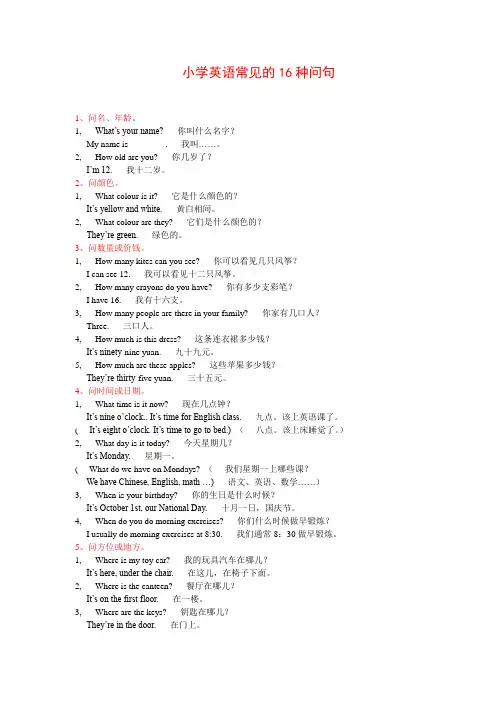
小学英语常见的16种问句1、问名、年龄。
1, ----What’s your name? ----你叫什么名字?----My name is ________. ----我叫……。
2, ----How old are you? ----你几岁了?----I’m 12. ----我十二岁。
2、问颜色。
1, ----What colour is it? ----它是什么颜色的?----It’s yellow and white. ----黄白相间。
2, ----What colour are they? ----它们是什么颜色的?----They’re green. ----绿色的。
3、问数量或价钱。
1, ----How many kites can you see? ----你可以看见几只风筝?----I can see 12. ----我可以看见十二只风筝。
2, ----How many crayons do you have? ----你有多少支彩笔?----I have 16. ----我有十六支。
3, ----How many people are there in your family? ----你家有几口人?----Three. ----三口人。
4, ----How much is this dress? ----这条连衣裙多少钱?----It’s ninety-nine yuan. ----九十九元。
5, ----How much are these apples? ----这些苹果多少钱?----They’re thirty-five yuan. ----三十五元。
4、问时间或日期。
1, ----What time is it now? ----现在几点钟?----It’s nine o’clock.. It’s time for English class. ----九点。
该上英语课了。
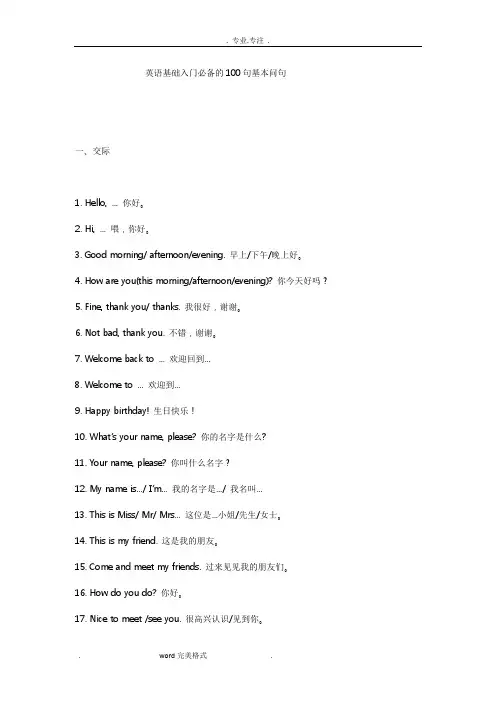
英语基础入门必备的100句基本问句一、交际1. Hello, …你好。
2. Hi, …喂,你好。
3. Good morning/ afternoon/evening. 早上/下午/晚上好。
4. How are you(this morning/afternoon/evening)? 你今天好吗?5. Fine, thank you/ thanks. 我很好,谢谢。
6. Not bad, thank you. 不错,谢谢。
7. Welcome back to …欢迎回到…8. Welcome to …欢迎到…9. Happy birthday! 生日快乐!10. What’s your name, please? 你的名字是什么?11. Your name, please? 你叫什么名字?12. My name is…/ I’m…我的名字是…/ 我名叫…13. This is Miss/ Mr/ Mrs…这位是…小姐/先生/女士。
14. This is my friend. 这是我的朋友。
15. Come and meet my friends. 过来见见我的朋友们。
16. How do you do? 你好。
17. Nice to meet /see you. 很高兴认识/见到你。
18. Goodbye. 再见19. Good night. 晚安。
20. How old is he? 他多大了?21. Thank you./ Thanks. 谢谢。
22. You’re welcome. 不用谢。
23. That’s all right. 没关系。
24. I’m sorry. 对不起。
25. Sorry, I don’t know. 对不起,我不知道。
26. Excuse me. 对不起,打扰一下。
27. Come in, please. 请进。
28. Have some bananas, please. 请吃些香蕉。
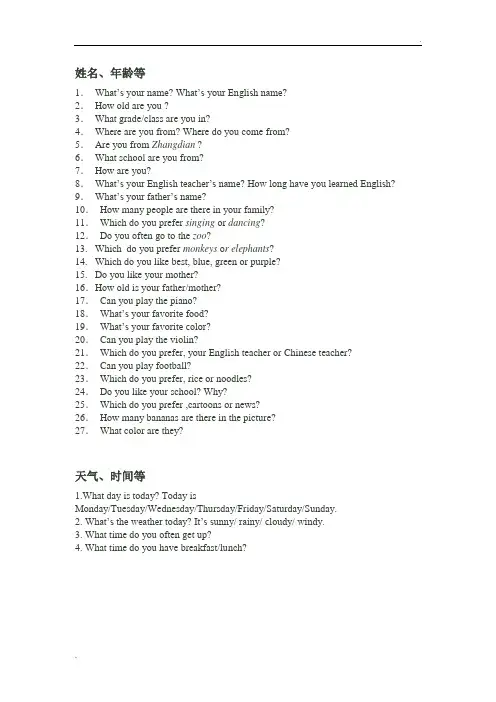
姓名、年龄等1.What’s your name? What’s your English name?2.How old are you ?3.What grade/class are you in?4.Where are you from? Where do you come from?5.Are you from Zhangdian ?6.What school are you from?7.How are you?8.What’s your English teacher’s name? How long have you learned English? 9.What’s your father’s name?10.How many people are there in your family?11.Which do you prefer singing or dancing?12.Do you often go to the zoo?13. Which do you prefer monkeys o r elephants?14. Which do you like best, blue, green or purple?15. Do you like your mother?16.How old is your father/mother?17.Can you play the piano?18.What’s your favorite food?19.What’s your favorite color?20.Can you play the violin?21.Which do you prefer, your English teacher or Chinese teacher? 22.Can you play football?23.Which do you prefer, rice or noodles?24.Do you like your school? Why?25.Which do you prefer ,cartoons or news?26.How many bananas are there in the picture?27.What color are they?天气、时间等1.What day is today? Today isMonday/Tuesday/Wednesday/Thursday/Friday/Saturday/Sunday.2. What’s the weather today? It’s sunny/ rainy/ cloudy/ windy.3. What time do you often get up?4. What time do you have breakfast/lunch?运动、食物、颜色等1. What’s your favorite animal/color/ food?2. What animal don’t you like?3. What food don’t you like?4. Do you like playing football?5. Do you like Yao Ming? Why?6. Do you like other sports?7. What’s your favorite sport?8. Do you like basketball?9. What color is your shirt?10. What do you like to eat?爱好、宠物等1. Do you like English book?2. If you don’t like reading, what do you like ?3. Do you have a pet?4. Do you have a cat or a dog?5. Do you like sports?6. What do you like ? I like reading and watching TV.7. What do you hope for? I hope to be a doctor.8. In the future, what job do you want?9. If you want to be a millionaire, what would you buy?10. Do you like cars? What color cars?11. Do you like banana? Do you eat banana every day?12. What’s your mother’s job?13. Do you like a sunny day or a rainy day? Why?14. Do you like summer or winter? I like summer because I can go swimming.15. Do you like watching TV?参考内容:(Color颜色:pink 粉红purple 紫色red 红色silver 银白色blue蓝色green 绿色white 白色yellow 黄色beige 米色black 黑色brown 咖啡色grey 灰色off-white 灰白色)(Sport运动:体操gymnastics 游泳swimming 篮球basketball 排球volleyball 乒乓球table tennis网球tennis 冲浪surfing 自行车cycling 羽毛球badminton 摔跤wrestling football 足球rugby 橄榄球ice skating 滑冰high jump 跳高long jump rowing 划船)(Food 食物:rice米饭bread面包beef牛肉milk牛奶water水egg蛋fish鱼cake蛋糕hamburger汉堡包French fries炸薯条noodles面条meat肉chicken鸡肉ice-cream冰淇淋Coke可乐juice果汁tea茶breakfast早餐lunch午餐dinner/supper晚餐meal一餐apple 苹果banana香蕉pear梨orange橙watermelon西瓜grape葡萄eggplant茄子green beans 青豆tomato西红柿potato土豆peach桃strawberry草莓cucumber黄瓜onion洋葱carrot 胡萝卜)。
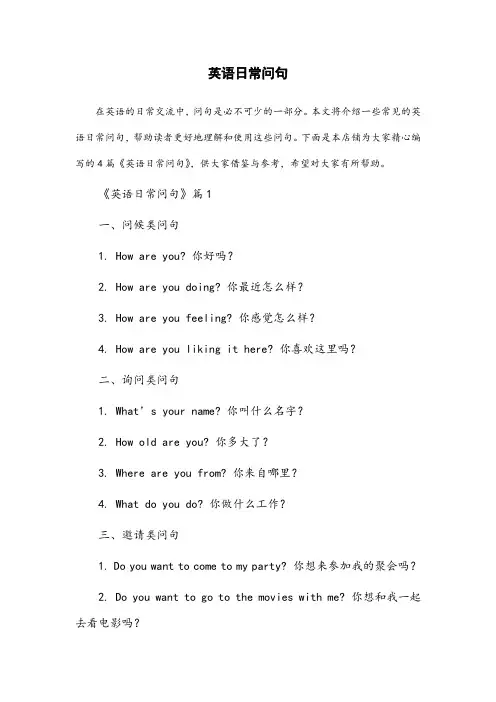
英语日常问句在英语的日常交流中,问句是必不可少的一部分。
本文将介绍一些常见的英语日常问句,帮助读者更好地理解和使用这些问句。
下面是本店铺为大家精心编写的4篇《英语日常问句》,供大家借鉴与参考,希望对大家有所帮助。
《英语日常问句》篇1一、问候类问句1. How are you? 你好吗?2. How are you doing? 你最近怎么样?3. How are you feeling? 你感觉怎么样?4. How are you liking it here? 你喜欢这里吗?二、询问类问句1. What’s your name? 你叫什么名字?2. How old are you? 你多大了?3. Where are you from? 你来自哪里?4. What do you do? 你做什么工作?三、邀请类问句1. Do you want to come to my party? 你想来参加我的聚会吗?2. Do you want to go to the movies with me? 你想和我一起去看电影吗?3. Do you want to try this new restaurant? 你想尝试这家新餐厅吗?四、关心类问句1. Are you okay? 你没事吧?2. Do you need help? 你需要帮忙吗?3. How can I help you? 我怎么帮助你呢?4. What can I do for you? 我能为你做什么?五、告别类问句1. Are you leaving already? 你这么早就要走了吗?2. Can I see you again? 我们还能再见面吗?3. How can I contact you? 我怎么联系你?4. Goodbye, see you later! 再见,后会有期!总结:英语日常问句在英语交流中发挥着重要的作用。
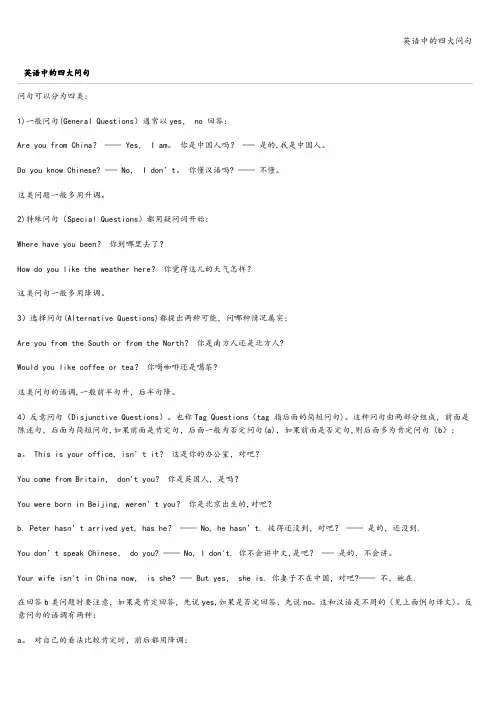
英语中的四大问句问句可以分为四类:1)一般问句(General Questions)通常以yes, no 回答:Are you from China?—— Yes, I am。
你是中国人吗? -—是的,我是中国人。
Do you know Chinese? -— No,I don’t。
你懂汉语吗? ——不懂。
这类问题一般多用升调。
2)特殊问句(Special Questions)都用疑问词开始:Where have you been?你到哪里去了?How do you like the weather here?你觉得这儿的天气怎样?这类问句一般多用降调。
3)选择问句(Alternative Questions)都提出两种可能,问哪种情况属实:Are you from the South or from the North?你是南方人还是北方人?Would you like coffee or tea?你喝咖啡还是噶茶?这类问句的语调,一般前半句升,后半句降。
4)反意问句(Disjunctive Questions)。
也称Tag Questions(tag 指后面的简短问句)。
这种问句由两部分组成,前面是陈述句,后面为简短问句,如果前面是肯定句,后面一般为否定问句(a),如果前面是否定句,则后面多为肯定问句(b):a。
This is your office, isn’t it?这是你的办公室,对吧?You come from Britain, don't you?你是英国人,是吗?You were born in Beijing, weren’t you?你是北京出生的,对吧?b. Peter hasn’t arrived yet, has he?——No, he hasn’t. 彼得还没到,对吧?——是的,还没到.You don’t speak Chinese, do you? —— No, I don't. 你不会讲中文,是吧? -—是的,不会讲。
日常英语口语问答句以下是一些日常英语口语问答句,供您参考:问句:1.What’s your name? 你叫什么名字?2.Where are you from? 你来自哪里?3.How old are you? 你多大了?4.What’s your job? 你是做什么工作的?5.How many people are there in your family? 你家有几口人?6.What do you like to do in your free time? 你业余时间喜欢做什么?7.What’s your favorite color/food/movie/song? 你最喜欢的颜色/食物/电影/歌是什么?8.Do you like to travel? 你喜欢旅行吗?9.What’s your favorite place to visit? 你最喜欢去的地方是哪里?10.How do you feel today? 你今天感觉怎么样?答句:1.My name is [Your Name]. 我叫[你的名字]。
2.I’m from [Your Country/City]. 我来自[你的国家/城市]。
3.I’m [Your Age] years old. 我[你的年龄]岁了。
4.I’m a [Your Job Title]. 我是[你的职业名称]。
5.There are [Number of People] in my family. 我家有[人数]口人。
6.In my free time, I like to [Your Hobby/Activity]. 我业余时间喜欢[你的爱好/活动]。
7.My favorite color/food/movie/song is [Your Favorite Thing]. 我最喜欢的颜色/食物/电影/歌是[你最喜欢的东西]。
8.Yes, I like to travel. 是的,我喜欢旅行。
小学英语常见的16种问句1、问名、年龄。
1, ----What’s your name? ----你叫什么名字?----My name is ________. ----我叫……。
2, ----How old are you? ----你几岁了?----I’m 12. ----我十二岁。
2、问颜色。
1, ----What colour is it? ----它是什么颜色的?----It’s yellow and white. ----黄白相间。
2, ----What colour are they? ----它们是什么颜色的?----They’re green. ----绿色的。
3、问数量或价钱。
1, ----How many kites can you see? ----你可以看见几只风筝? ----I can see 12. ----我可以看见十二只风筝。
2, ----How many crayons do you have? ----你有多少支彩笔? ----I have 16. ----我有十六支。
3, ----How many people are there in your family? ----你家有几口人? ----Three. ----三口人。
4, ----How much is this dress? ----这条连衣裙多少钱?----It’s ninety-nine yuan. ----九十九元。
5, ----How much are these apples? ----这些苹果多少钱?----They’re thirty-five yuan. ----三十五元。
4、问时间或日期。
1, ----What time is it now? ----现在几点钟?----It’s nine o’clock.. It’s time for English class. ----九点。
精心整理
精心整理
英语中的四大问句
问句可以分为四类:
1)一般问句(GeneralQuestions )通常以yes,no 回答:
AreyoufromChina?——Yes,Iam.你是中国人吗?——是的,我是中国人。
234YouwereborninBeijing,weren'tyou?你是北京出生的,对吧?
b.Peterhasn'tarrivedyet,hashe?——No,hehasn't.彼得还没到,对吧?——是的,还没到。
Youdon'tspeakChinese,doyou?——No,Idon't.你不会讲中文,是吧?——是的,不会讲。
Yourwifeisn'tinChinanow,isshe?——Butyes,sheis.你妻子不在中国,对吧?——不,她在。
在回答b 类问题时要注意,如果是肯定回答,先说yes ,如果是否定回答,先说no 。
这和汉语是不同的(见上面例句译文)。
反意问
精心整理
句的语调有两种:
a.对自己的看法比较肯定时,前后都用降调:Beijingisabeautifulcity(降调),isn'tis?(降调) MaryspeaksgoodChinese(降调),doesn'tshe?(降调)
b.对自己的看法不肯定时,前面用降调,后面则用升调:He'llbebacktomorrow(降调),won'the?(升调)
精心整理。
1、什么、怎样——what 1). What’s your name?My name is ________.你叫什么名字?我叫……。
2). What color is it?It’s yellow and white.它是什么颜色的?黄白相间。
3). What color are they?They’re green.它们是什么颜色的?绿色的。
4).What’s she like?She’s young and thin.她长什么样儿?她很年轻、苗条。
1). What would you like for breakfast / lunch / dinner ?I’d like some bread and milk / rice and soup.你早餐/中餐/晚餐想吃点什么?我想吃面包和牛奶/米饭和汤。
2). What’s for breakfast / lunch / dinner?Hamburgers and orange juice.早餐/中餐/晚餐吃什么?汉堡包和橙汁。
1). What’s the weather like in Beijing?It’s rainy today. How about New York?( It’s sunny and hot.)北京的天气如何?今天是雨天。
纽约呢?( 今天是晴天,天气很热。
)2). What’s the matter?My throat is sore. (I have a sore throat.)怎么了?我的喉咙疼。
1). What’s your fathe r / mother?He’s a doctor. / She’s a teacher.你的父亲/ 母亲是做什么的?他是一名医生。
/ 她是一名教师。
2). What does you mother / father do?She’s a TV reporter. / He’s a teacher. He teaches English.你的母亲/ 父亲是做什么的?她是一名电视台记者。
小学英语常见的16种问句1、问名、年龄。
1, ----What’s your name? ----你叫什么名字?----My name is ________. ----我叫……。
2, ----How old are you? ----你几岁了?----I’m 12. ----我十二岁。
2、问颜色。
1, ----What colour is it? ----它是什么颜色的?----It’s yellow and white. ----黄白相间。
2, ----What colour are they? ----它们是什么颜色的?----They’re green. ----绿色的。
3、问数量或价钱。
1, ----How many kites can you see? ----你可以看见几只风筝?----I can see 12. ----我可以看见十二只风筝。
2, ----How many crayons do you have? ----你有多少支彩笔?----I have 16. ----我有十六支。
3, ----How many people are there in your family? ----你家有几口人?----Three. ----三口人。
4, ----How much is this dress? ----这条连衣裙多少钱?----It’s ninety-nine yuan. ----九十九元。
5, ----How much are these apples? ----这些苹果多少钱?----They’re thirty-five yuan. ----三十五元。
4、问时间或日期。
1, ----What time is it now? ----现在几点钟?----It’s nine o’clock.. It’s time for English class. ----九点。
该上英语课了。
小学英语常见的16种问句1、问名、年龄。
1, ----What’s your name ----你叫什么名字----My name is ________. ----我叫……。
2, ----How old are you ----你几岁了----I’m 12. ----我十二岁。
2、问颜色。
1, ----What colour is it ----它是什么颜色的----It’s yellow and white. ----黄白相间。
2, ----What colour are they ----它们是什么颜色的----They’re green. ----绿色的。
3、问数量或价钱。
1, ----How many kites can you see ----你可以看见几只风筝----I can see 12. ----我可以看见十二只风筝。
2, ----How many crayons do you have ----你有多少支彩笔----I have 16. ----我有十六支。
3, ----How many people are there in your family ----你家有几口人----Three. ----三口人。
4, ----How much is this dress ----这条连衣裙多少钱----It’s ninety-nine yuan. ----九十九元。
5, ----How much are these apples ----这些苹果多少钱----They’re thirty-five yuan. ----三十五元。
4、问时间或日期。
1, ----What time is it now ----现在几点钟----It’s nine o’clock.. It’s time for English class. ----九点。
该上英语课了。
(----It’s eight o’clock. It’s time to go to bed.) (----八点。
英语日常交流的常见问句!---相当实用---语言是文化的载体。
一旦会用另一种语言提问了,那就意味着你掌握了打开另一扇文化之门的钥匙。
英语中基本的疑问词不外乎what, where, when, who, which, why和how这么几个,下面这七十个句子,足以让你得到你最想要的。
一:关于What口语中最常用的问题:time is it(几点了) 2 . What are you doing(你在干什么)did you say(你说什么) 5. What do you think(你认为怎样)do you recommend(你有何推荐的)are you looking for(你在找什么)is this for(这是用来做什么的)《would you like to drink(你想喝什么)do you call this in English(这用英语怎么说)school do you go to(你在哪所学校就读)二:关于Where口语中最常用的问题:1.Where are you from(你从哪里来)2. Where is your company(你们公司在哪3. Where is the restroom(洗手间在哪)4. Where are you headed(你去哪里)5. Where should I pay(我该在哪里交钱)6. Where did you buy it(你在哪买的)7. Where did you learn English(你在哪学的英语)》8. Where do you work(您在哪里高就)9. Where would you like to go(你想去哪里)10. Where have you been(你去哪了)三:关于When口语中最常用的问题:1.When did you come here(你何时到的)2. When does the meeting start(会议何时开始)3. When will you finish your work(你何时做完)4. When is this due(什么时候到期)5. When will the flight arrive(飞机何时到港)6. When are you free(你什么时候有空)7. When is your birthday(你的生日是何时)~8. When is he coming back(他什么时候回来)9. When does the store open(商店什么时候开门)10. When can I see you again(我何时可以再见到你)四:关于Who口语中最常用的问题:1. Who did that(那是谁干的)is she(她是谁)’s calling(您是哪一位)do you think you are(你以为你是谁)will take over his job(谁来接管他的工作)does this belong to(这是谁的)told you that(谁告诉你的)asked you(谁问你了);are you looking for(你在找谁)do you think you are talking to(你以为你在跟谁说话)五:关于Which 口语中最常用的问题:1.Which is yours(哪一个是你的)2.Which hotel are you staying in(您在哪个宾馆下榻)3.Which is better(哪一个更好一点)4.Which city do you like best(你最喜欢哪个城市)5.Which one should I buy(我该买哪一个)6.Which train should I take(我该坐哪趟火车)7.Which department do you work for(你在哪个部门工作)8.9.Which restaurant do you recommend(你推荐哪个饭店)10.Which number should I call(我该打哪个电话)11.Which newspaper do you read(你读哪家报纸)六:关于Why 口语中最常用的问题:1. Why is that(那是怎么回事)2. Why not(为什么不呢)3. Why did you say that(你为什么那么说)4. Why would you quit your job(你为何要辞职)5. Why did you come to China(你为要到中国来)6. Why do you study English(你为何要学英语)(7. Why are you so happy(你怎么这么高兴)8. Why are you late(你为什么晚了)9. Why do you ask(你问这个干什么)10. Why can’t you come(你为什么来不了)七:关于how 口语中最常用的问题:1. How are you(你好吗)2. How can I help you(我能帮你什么忙吗)3. How much is it(这个多少钱)4. How long have you been in China(你来中国多久了)5. How about having dinner with me(跟我一起吃晚饭好吗)6. How do you like it(你喜欢吗)~7. How are you feeling(你感觉怎么样)8. How many children do you have(你有几个孩子)9. How was the meeting(会议开得怎么样)10. How’s business(生意怎么样)各位亲爱的学员:欢迎来到第17单元的训练内容,语音是基本功,语法、词汇、句型是知识的累计。
学口语最重要就是句型!这一课我为特意为大家准备了30个英语口语中最重要的超级句型,希望大家一定能早日实现用英语口语自由表达的时候!好下面让我们来开始学习这23个超级句型吧!口语最重要的超级句型The most important sentence patterns第一:表示想要做某事的超级句型:I want…1. I want to speak English. 我想学说英语。
}2. I want to buy something/do some shopping.我想去买点东西。
3. I want something to eat.我想吃点东西。
第二:表示请求的超级句型:Can you…1. Can you help me你能帮助我吗2. Can you show me around你能带我走走吗3. Can you e-mail the report to me你能不能用电子邮件把报告传给我第三:表示需要的超级句型:I need…1. I need your help.我需要你的帮助。
)2. I need more time.我需要一点时间。
3. I need to see you for a minute.我想见见你。
4. 表示请求允许的超级句型:Let me…1. Let me help you.让我来帮你。
2. Let me introduce myself.让我来做自己介绍。
3. Let me see it.让我看一下。
第四:表示自己意愿的超级句型:I hope…1. I hope so.我希望如此。
2. I hope you will enjoy your stay here.我希望你在这里过得愉快。
3. I hope you can forgive me.我希望你能原谅我。
第五:表示不得不做某事的超级句型:Have to…1. I have to work hard everyday.我不得不每天努力工作。
2. I have to check my schedule.我必须查一下我的行程表。
3. I have to finish my report today.我今天必须写完报告。
第六:表示主观感觉的超级句型:It sounds…1. It sounds good to me.听起来不错。
—2. It sounds like a good idea.像是个好主意。
3. It sounds interesting.听起来很有趣。
第七:表示“征求某人意见、看法”的超级句型:How about…1. How about you你呢2. How about your plan你有何计划3. How about taking a walk出去散散步怎么样第八:表示询问种类、形式的超级句型:What kind of …1. What kind of food do you like best你最喜欢吃什么—2. What kind of work do you do你从事什么工作3. What kind of sports do you play你会什么运动项目第九:问意见的超级句型:What do you think of…1. What do you think of Chinese food你喜欢中国菜吗2. What do you think of his proposal你觉得他的提议怎么样3. What do you think of my new hairstyle 你觉得我的新发型如何第十:打算做某事的超级句型:I’m thinking about…1. I’m thinking about going abroad.我打算出国。
[2. I’m thinking about changing my job.我打算换个工作。
3. I’m thinking about what you said.我在考虑你说的话。
第十一:表示道歉的超级句型:I’m sorry (that)…对不起……1. I’m sorry I can’t come. 对不起,我来不了了。
2. I’m sorry I can’t help you. 对不起,我帮不了你。
3. I’m sorry I overslept. 对不起,我睡过头了。
第十二:表示需求对方一致意见的超级句型:Isn’t it…难道不是……吗1.Isn’t it a lovely place 这难道不是一个好地方吗:2.Isn’t it pleasant weather 这难道不是个好天气吗3.Isn’t it a coincidence 这难道不是一个巧合吗第十三:表示委婉的拒绝或回答的超级句型:I’m afraid…恐怕……1 I’m afraid you’re wrong. 恐怕是你错了。